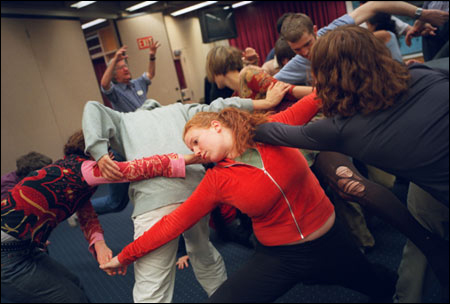A new study investigates the effectiveness of a drama therapy program for women who have endured intimate partner violence (IPV).
The researchers, Maria Mondolfi Miguel and Margarita Pino-Juste, from the University of Vigo in Spain, used a mixed-methods design to study the efficacy of a program based on psychodrama, psychotherapy, and the theatre of the oppressed. Their results suggest that the drama therapy approach led to a significant reduction of depressive symptoms and increased life purpose while increasing communication, camaraderie with other participants, and insight into the relationship between their symptoms and their experiences of IPV. The authors write:
“Considering the high worldwide incidence rate of domestic violence against women, the corresponding psychological malaise suffered by the victims, and the limited amount of research on interventions based on theater and drama therapy with women victims of IPV, we think it is imperative to keep cementing the empirical foundation on the effectiveness of these techniques.”

Intimate partner violence is a pattern of behavior – often in the form of physical, psychological, or sexual violence, or the threat of violence – that seek to control a romantic partner. This is the most common form of violence women experience internationally.
The cycle of abuse has been characterized by overlapping yet discrete phases. During the initial phase, tension builds, and the survivor of IPV usually becomes submissive to alleviate her partner’s aggression. Following the initial stage, the perpetrator of domestic abuse explodes and batters their partner. Finally, the abuser promises to change, apologizes, and becomes more affectionate during the honeymoon stage. After a series of tense events, the cycle begins anew.
Others have highlighted that IPV isn’t only a cyclical interpersonal dynamic, but it is generated through coercive control that can be exerted through gendered power dynamics. The authors add:
“Both woman abuse and IPV occur in a social context dominated by structures that can have a differential effect on women, especially in patriarchal cultures or in the case of women suffering double discrimination because of their ethnic origins, nationality, or socioeconomic condition; discrimination is not always only predicated on gender, and exclusion conditions make it more difficult for certain women to end the situation of suffering in which they find themselves.”
Survivors of IPV are often diagnosed with depressive, anxiety, eating, and substance use disorders, as well as PTSD. They often report experiencing increased physical health concerns, isolation, guilt and rage, hopelessness, suicidal ideation, and reduced self-esteem and self-worth.
The purpose of this study was to assess a drama-focused therapy program’s effectiveness in fostering self-esteem, quality of life, communication skills, and purpose in life, while reducing PTSD, depression, and anxiety symptoms, as well as sexist stereotypes, in women survivors of IPV. The program integrated components of drama therapy, psychodrama, and the theater of the oppressed.
Drama therapy uses the healing qualities of drama, such as creativity, imagination, and insight, to foster healing and change. Combined drama therapy and expressive art therapies effectively reduce the suffering of women who have experienced IPV.
Psychodrama is a technique aimed at developing spontaneity and resolving psychological conflict in group psychotherapy. This involves playing out conflict and then discussing them with the group to provide emotional processing and create insight into the psychological, interpersonal, and social issues experienced by the participants.
Finally, the Theater of the Oppressed is a pedagogical strategy that entails improvising the experiences of oppression lived by the actors partaking in the exercise. The participants also direct others in their roles, and a variation of each scenario and roles are played out. This facilitates a process of discussing the conflicts being lived by participants. Through imagination and co-creation, they develop strategies for the possibility of change.
The participants of the study were 17 Spanish women with children and who had experienced IPV. Three were single, three separated, six were divorced, and eight were married (5 of them still married to their abusive husbands). Their age ranged between 21-52; most were unemployed and had no vocational training or formal primary education.
The study participants partook in twenty, two-hour sessions of drama-focused group therapy. These sessions were divided into three phases: warming-up, action, and sharing. These exercises served as psychotherapeutic interventions to reduce psychological distress while developing social and personal competencies and skills to address sexist stereotypes that they had internalized. The efficacy of the intervention was studied by assessing symptoms and stereotypes before and after treatment and evaluating change through statistical and testimonial evidence.
The authors found statistically significant reductions in depressive symptoms and sexist stereotypes. They also saw an increase in these women’s purpose in life, finding that they valued their lives more and found more reasons to live. They were also more likely to see positive meaning in aspects of their everyday lives.
PTSD was not significantly reduced, possibly due to the presence of violence still being experienced by the participants. Most continued to have contact with the perpetrator of IPV due to shared custody, the inability to enforce restraining orders, and insufficient financial resources.
The drama-based interventions also allowed the participants to notice verbal and non-verbal communication issues, identify social and interpersonal factors that played a role in developing these issues, and overcome low self-confidence and self-esteem. Finally, they were able to identify the cycle of violence and its relationship to gendered power dynamics while finding camaraderie amongst one another.
This study suggests that drama-based group therapy can be an effective treatment for the psychological effects of IPV. By integrating critical concepts of the theater of the oppressed, survivors of abuse can also gain insight into the sociopolitical factors that influence this interpersonal dynamic. Finally, this approach to group therapy fosters interpersonal relationships between members that can alleviate distress and social isolation experienced by women who experience IPV.
****
Mondolfi Miguel, M. L., & Pino-Juste, M. (2020). Therapeutic Achievements of a Program Based on Drama Therapy, the Theater of the Oppressed, and Psychodrama With Women Victims of Intimate Partner Violence. Violence Against Women, 107780122092038. DOI:10.1177/1077801220920381 (Link)















How can I get in contact. I find this article relates to my situation and would love to speak with the author
Report comment